‘My government, my pride’ – Foreign Affairs joins canal parade for equal rights LGBTIQ+
This year, the Ministry of Foreign Affairs is joining other ministries and government organisations in hosting the Dutch Government Pride boat during the Canal Parade, part of Amsterdam Pride. By joining the parade, we aim to focus attention on human rights in general and the acceptance and equality of the LGBTIQ+ community in the Netherlands, worldwide, within our own organisation and across central government.
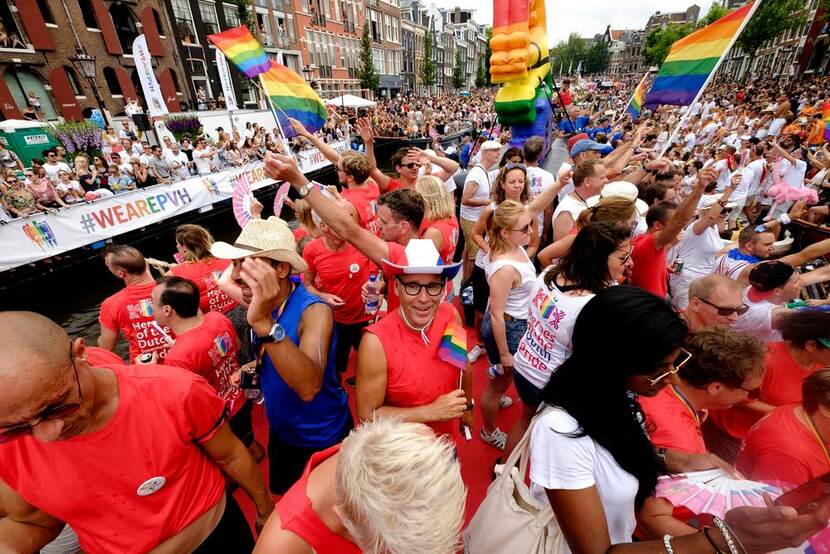
At next Saturday’s Canal Parade, Foreign Affairs Secretary-General, Paul Huijts, will be on boat 64, representing Dutch Government Pride – the umbrella foundation of LGBTIQ+ networks within government. He will join around 100 colleagues from Foreign Affairs, other ministries and government organisations to highlight this year’s theme: ‘My government, my pride’ (based on the Amsterdam Pride theme: ‘My gender, my pride’).
Next to our Secretary-General the following people will also be on the boat: the Minister of Social Affairs and Employment Karien van Gennip, the State Secretary for Asylum and Migration Eric van der Burg and various directors of the other government organizations.
We are proud that a Dutch Government Pride can exist in the Netherlands. It enables us to demonstrate the work we are doing within government to promote the safety of LGBTIQ+ colleagues at work and our visible and invisible efforts to improve the acceptance of the LGBTIQ+ community in the Netherlands, the wider world and within government organisations.
‘With the Dutch Government Pride boat, we’re demonstrating that central government (the Netherlands’ largest employer) aims to offer a working environment where everyone is respected and accepted as an individual, and that includes LGBTIQ+ colleagues. For an organisation like Foreign Affairs, this is a core value and one that we advocate worldwide’, says Secretary-General Paul Huijts.
This is the third time that the LGBTIQ+ networks of Dutch ministries (Foreign Affairs; Agriculture, Nature and Food Quality; Infrastructure and Water Management; Social Affairs and Employment; Health, Welfare and Sport; Finance), the Tax and Customs Administration and the Netherlands’ Food and Consumer Product Safety Authority (NVWA) have joined forces in this way to host the Dutch Government Pride boat during the Canal Parade.
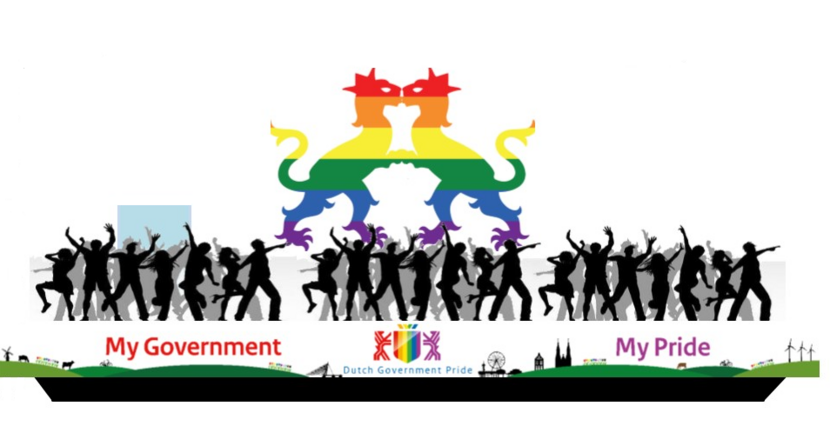
LGBTIQ+ network “Out There”
‘By taking part in the parade, we’re demonstrating that we’re making active efforts as LGBTIQ+ networks to increase acceptance of LGBTIQ+ colleagues working in government organisations’, says Deborah Landman, administrative secretary of ‘Out There’; the Foreign Affairs LGBTIQ+ employee network.
‘Part of this involves acting as a dialogue partner for our colleagues, our administrators, Works Council, Human Resources and management. By doing so, we’re demonstrating that diversity and inclusion are always important for the organisation and not only during Pride month in June.’
‘We believe it’s important to communicate the fact that you can achieve more and are much stronger if you work together as a network. At the Canal Parade, we’re proud to serve as role models, demonstrating our advocacy of an inclusive and safe working environment where you can be yourself, be heard, seen and valued, for everyone in the Netherlands and worldwide. Our aim is to achieve 100% acceptance and we’re not there yet.’
This is the third time Deborah has joined Amsterdam’s Canal Parade on behalf of employee network Out There. ‘The previous times were just fantastic experiences. All those people watching and cheering from the canalside – it’s truly amazing how much interest there is. This year, we have two gender-neutral rainbow lions on the boat in order to give a visual nod to the theme of ‘My gender, my pride’.’
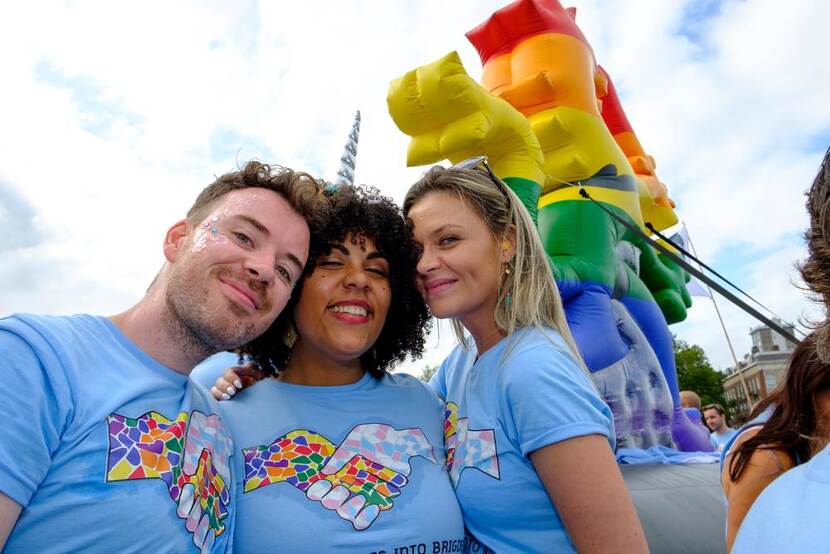
Building bridges for LGBTIQ+ rights
Across the world, lesbians, gays, bisexuals, transgender, intersex and queer people and others who choose a different way of describing their gender or sexuality (LGBTIQ+) face discrimination and violence. But everyone has the right to be themselves, irrespective of who you are or whom you love.
That is why the Ministry of Foreign Affairs works on behalf of the Netherlands all year round to promote equal rights for LGBTIQ+s worldwide. This happens at the ministry, at the embassies and at international organisations. For example, the embassies maintain contact with and support local LGBTIQ+ organisations. They also support LGBTIQ+ rights via the Human Rights Fund (Mensenrechtenfonds). Every year, they mark Pride Month and draw attention to the International Day against Homophobia and Transphobia on 17 May (IDAHOT).
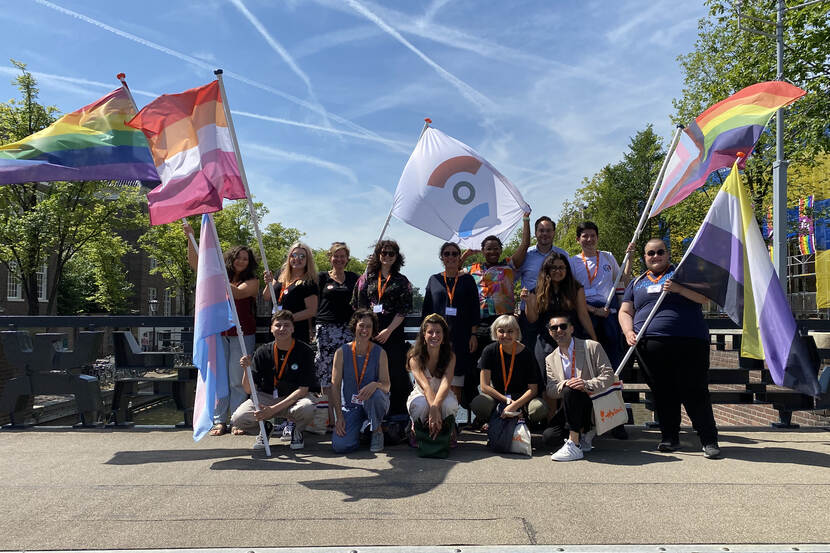
The rights of LGBTIQ+ people across the world remain under threat. ‘This year is also special in that sense, because several international LGBTIQ+ activists are joining Dutch Government Pride to focus attention on that’, says Anne Roos Wasser, LGBTIQ+ policy advisor on human rights at Foreign Affairs. Those taking part are young LGBTIQ+ activists from Europe and beyond who are active in community building, empowerment and mobilisation and promoting equal rights. All of them are bridge builders: LGBTIQ+ activists who participate fully in their networks and actively liaise with stakeholders and other interested parties.
As part of the Building Bridges programme – launched in 2012 – an international group of young LGBTIQ+ activists visits the Netherlands every year. Building Bridges aims to teach them the knowledge and skills they need to improve the situation of the LGBTIQ+ community in their own countries.
Anne Roos: ‘This year’s programme focuses on the specific challenges faced by LGBTIQ+ activists in Eastern and Central Europe and Central Asia, the anti-gender and anti-LHGTIQ+ pushback they are experiencing and how to overcome it by building bridges and finding allies.’
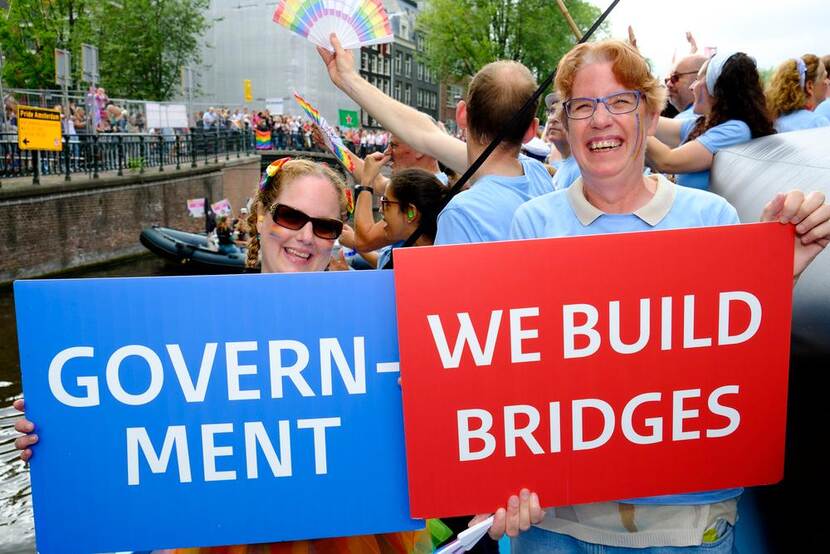
In the six-day programme, participants are given information on the themes of gender and sexuality, human rights, international legislation in relation to LGBTIQ+ rights and on how the LGBTIQ+ issue is coordinated in the Netherlands. Anne Roos: ‘The programme provides an opportunity to share knowledge, network and encourage young organisations and activists. Participants have the chance to work on their own personal stories and to share them with a wider public.’
Building Bridges is an initiative of the Ministry of Foreign Affairs, the Netherlands Enterprise Agency (RVO), COC Netherlands and the Ministry of Education, Culture and Science (OCW).
Human Rights Report
Would you like to know more about the Dutch efforts abroad for, among others, LGBTIQ+ and the results of the past year? Then read the Human Rights Report 2021 (in Dutch).